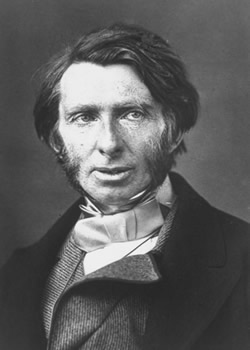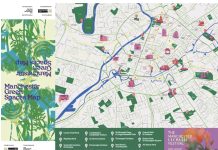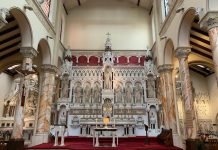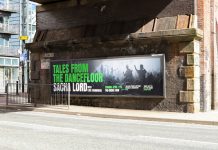2019 marks the 200th birthday of artist, writer, social reformer, philanthropist and ecologist John Ruskin (1819–1900), who in his lifetime influenced the world of 19th Century industrial Manchester and whose legacy has had a lasting impact on the city.
Across the summer this remarkable story will be explored by Ruskin in Manchester, a festival presenting a diverse and creative programme of events. The festival is funded and supported by Manchester Metropolitan University and Ruskin’s Guild of St George.
Manchester Cathedral, Elizabeth Gaskell’s House, Manchester Metropolitan University Special Collections, The Portico, The Holden Gallery and many more Manchester cultural organisations will be holding exhibitions and events that invite people to discover and experience the vast legacy of Ruskin and how the ideas he championed are as powerful and relevant now as they ever were.
As a visionary thinker, expressions of Ruskin’s ideas can be seen in the creation of the National Trust, the concept of Green Belt, the creation of the Welfare State and National Health Service, and The Big Draw (originally the Guild of St George’s Campaign for Drawing).
Some of his most important lectures were given in Manchester, including two linked to the Art Treasures exhibition of 1857. And it was in Manchester that the first Ruskin Society was founded in 1878 by some of the city’s most influential people, who organised the first exhibition (1904) entirely dedicated to Ruskin.
Ruskin in Manchester curator Dr Rachel Dickinson, a Principal Lecturer at Manchester Metropolitan University and Director of Education for Ruskin’s Guild of St George, says, “The relationship between Manchester and Ruskin is fascinating. Ruskin raged against the city for its pollution, dirty industrial environment and poor living conditions. Its reaction says a lot about Manchester, whose people and civic leaders listened and responded to Ruskin’s ideas around art, craft, education, localism and sustainability as they sought to make the city a happier and healthier place to live. At the heart of this is a special relationship that can still be found in Manchester today.”
Ruskin’s Art Treasures lectures of 1857 have raised some of the questions behind The Whitworth’s Joy For Ever exhibition (until Sunday 9 June). Navigating the possible answers are works that feature the gallery’s own collection, which was founded on the principals of Ruskinian thinking; pieces by artists such as Emily Gertrude Thomson and J.M.W.Turner, sit alongside new commissions for the exhibition.
The importance of art education was something that Ruskin spoke of during his lecture at Manchester School of Art in 1859.
One of the oldest art schools in the country (founded in 1853), its collections are now part of Manchester Metropolitan University Special Collections. Key objects and artworks including books, drawings, paintings, studio pottery and textiles from its extensive collections and loans from Ruskin-related collections will be exhibited in Ruskin’s Manchester: ‘Devils Darkness’ to Beacon City (Monday 24 June to Friday 23 August).
Held in the Special Collections Gallery, the exhibition will trace Ruskin’s relationship with Manchester from the smog he described as ‘Devil’s Darkness’ to the city’s response to him, and the continuing relevance of his message to Manchester: that ‘the hand, the head, and the heart’ coming together craft fine art and a happy life.
The exhibition of national art competition The John Ruskin Prize 2019: Agent of Change, organised by The Big Draw, is being hosted by Manchester Metropolitan University’s Holden Gallery (Thursday 11 July to Saturday 24 August).
Linked activities include a SketchCrawl led by one of the selection panelists, architectural historian, artist and broadcaster Dr Jonathan Foyle (Wednesday 10 July).
42nd street / The Horsefall is holding a series of photography walks around Ancoats and the Northern Quarter for young people (13 to 25). These free sessions are intended to be an antidote to today’s busy world, with the chance to reflect upon the influence of nature and architecture, and to seek peace. Walks will take place on Saturday 18 May and Saturday 8 June.
The themes of observation, beauty, craft and wellbeing can all be found in Writing the Cathedral (Saturday 25 May). This poetry-writing workshop invites participants to consider the crafted objects and artworks found in Manchester Cathedral and to open their thoughts and minds. The Cathedral is also hosting a Ruskin-inspired guided tour of its ‘The Kingdom of Heaven’ silk-embroidered altar frontals, led by the artist Cristina Rodrigues (Monday 24 June).
Elizabeth Gaskell’s House will be marking John Ruskin’s birthday with a programme of events supported by The National Lottery Heritage Fund that explore the relationship between these two mutual admirers and influencers of Victorian life, leading with the exhibition “My Dear Mr Ruskin…” Friendship, Inspiration and Scandal (Wednesday 17 July 2019 to Monday 1 June 2020). This exhibition takes the visitor on a journey from the studios of the Pre-Raphaelites and the Italian grand tour to legacies in education and social reform, to highlight the contributions of Ruskin and the Gaskell family.
Elizabeth Gaskell’s House will also be hosting a series of family friendly workshops each Wednesday of the school summer holidays (24 July to 28 August) that invite young makers to take part in an array of activities from cloud spotting and poetry writing to nature observations and sketching. On Friday 9 August urban sketcher Liz Ackerley will be hosting a sketch workshop that draws upon the inspiration of Ruskin.
Talks, discussions and round tables all feature within the Ruskin in Manchester programme. These include a talk at Manchester Art Gallery on Saturday 8 June by award-winning journalist Andrew Hill, whose new book ‘Ruskinland’ tells of the life, ideas and lasting influence of John Ruskin. Also taking place at the Gallery will be tours by Curator of Fine Art, Hannah Williamson, which consider what Ruskin had to say about works in Manchester’s collection (Monday 17 June, Tuesday 25 June and Wednesday 3 July), and a recreation of Ruskin’s lecture ‘The Accumulation and Distribution of Art’, in which actor and art historian Paul O’Keeffe will present himself as John Ruskin on the very date that Ruskin gave this lecture at Manchester Art Gallery’s Athenaeum in 1857 (Saturday 13 July).
For further information and the full programme of all Ruskin in Manchester events, with more being added, visit www.ruskinprize.co.uk/







